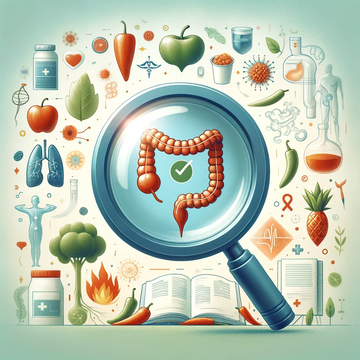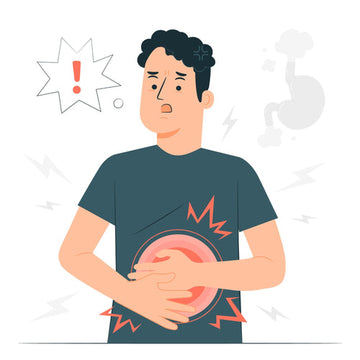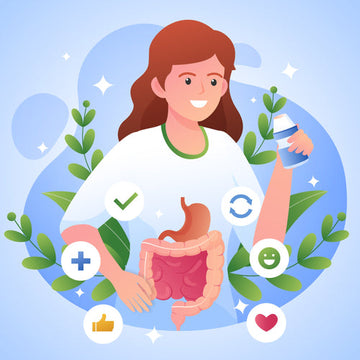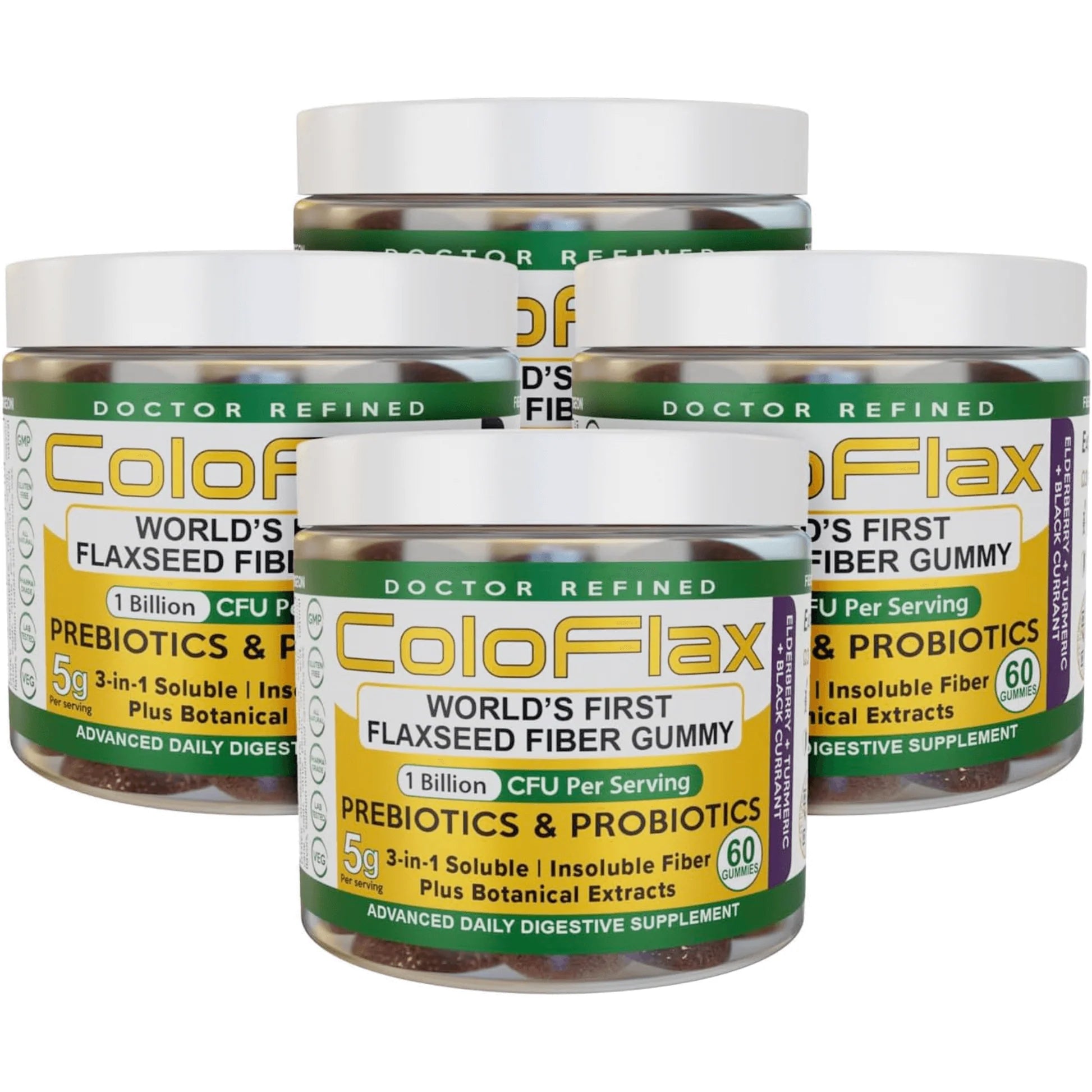Myths blur reality, and where health and wellness is concerned, they often take people down reckless and even dangerous paths. At best, they may avoid something beneficial or partake in something ineffective; at worst, they could commit to something that seriously harms their health.
There are a number of popular myths concerning digestive health, and we’ll address them here.
Myth 1: All Fiber is the Same
Whether you’re getting your fiber from seeds, beans, bread, supplements, or even cakes, it’s all the same, right? Not at all.
Not only can the quality vary with regard to additional calories, macronutrients, and micronutrients, as well as the actual quantity of fiber, but there are also two different types of fiber: insoluble and soluble.
Soluble fiber dissolves in water whereas insoluble fiber does not, and this makes a massive difference in your gut.
Found in beans and fruits, among other things, soluble fiber creates a gel-like substance in the gut. If you’ve ever taken psyllium husk or other powder-based supplements that you mix with water, you’ll have a good idea of what this substance looks like. It works by moving slowly through the gut, absorbing water, growing in size, and pushing other waste out.
As for insoluble fiber, it’s commonly found in bran and vegetables and doesn’t dissolve in water. Instead, it adds to the bulk of the stool, thus making it easier to pass.
A healthy gut requires a balance of both soluble and insoluble fiber, so they definitely aren’t the same and you shouldn’t rely on just one of them.
Myth 2: Spicy Foods are Very Bad/Good for You
There are a few myths surrounding spicy foods.
Many people swear that spicy foods make them ill, giving them heartburn, diarrhea, and even abdominal pain. At the same time, you’ll find countless articles on “digestive myths” that tell you it’s all nonsense.
So, what’s the truth?
Well, it’s a little from column A and a little from column B.
For the most part, spicy foods are perfectly fine and can actually be good for you. Research suggests that a diet containing a generous amount of capsaicinoids (the chemicals responsible for the “burn”) may lead to a longer life and support a variety of bodily processes.(1)
They also don’t cause hemorrhoids, with one study showing that people taking a capsule of red hot chili powder didn’t notice any effect on their hemorrhoid symptoms.(2)
But there are some caveats.
Firstly, overindulging in spicy foods can be detrimental, as can eating dangerously hot foods. Recently, a manufacturer of hot chips designed for “challenges” took its products off the shelves after a teenager died, and others have reported serious adverse reactions. In one case, a man ruptured his esophagus after vomiting excessively following a pepper-eating contest. (3)(4)
What’s more, spicy foods can give some people abdominal discomfort and pain, including those with inflammatory bowel disease.
So, it really depends. If you feel discomfort every time you eat spicy foods, you’re not imagining it, and while peppers probably won’t cause long-term symptoms, you should consider limiting your intake. If you don’t have any such symptoms, load up on the capsaicin, just don’t go overboard, and be sure to give those challenges a miss.
Myth 3: High-Fiber Diets Are Only Beneficial for Your Digestive Health
As noted in our previous guide to the benefits of a high-fiber diet, adding more fiber to your day could greatly improve your health, supporting everything from digestive health and weight regulation to heart health.
It has been estimated that just 5% of Americans eat enough fiber, and if the other 95% followed suit, it could greatly improve the health prognosis of millions of Americans.(5)
Your whole body will benefit if you eat more fiber, so don’t just limit your intake for when you’re feeling a little gridlocked and need to get things moving again.
Myth 4: Fiber Helps with Constipation But Gives You Diarrhea
If you’re constipated, eat fiber; if you have diarrhea, stick with rice and other “binding” foods. That’s how the advice usually goes, but that’s simply not how fiber works.
As noted above, soluble fiber creates a bulky substance in the gut and this bulk moves slowly, gathering other waste in the process. It might seem counterintuitive, but ensuring you eat plenty of fiber while you have diarrhea could slow things down without messing up your diet or making you constipated.
Myth 5: You Should Have a Bowel Movement Every Day
Some people have a bowel movement every day without fail. If that changes and they go several days without, it could mean they are constipated. But that doesn’t apply to everyone.
There is no “normal” for everyone, only a normal for you. So, if you go every few days, that’s fine, and you don’t need to worry until that changes. Constipation is not defined as “not going every day” but rather “having fewer than three bowel movements per week”.
Myth 6: Fiber Supplements are Laxatives
Although supplements like psyllium husk are often marketed as laxatives and used for that purpose, they are just a big dose of fiber. You don’t need to only take them when you’re constipated. In fact, many people choose to take regular amounts to ensure they meet their fiber goals and stay regular.
The same is true for ColoFlax, which was designed for regular use and contains both insoluble and soluble fiber, as well as prebiotics, probiotics, minerals, vitamins, essential fatty acids, and antioxidants.
Myth 7: It Takes 7 Years to Digest Gum
This is an old myth that is somehow still doing the rounds. Gum is for chewing and it can’t be digested, so this is likely where the myth comes from. But fiber isn’t digested either, and that doesn’t mean it’s staying in your gut for 7 years!
Refrain from swallowing gum if you can, but don’t worry if you do. As long as it’s not an excessive amount that risks becoming lodged in your throat, it will be passed out along with everything else you eat.
Myth 8: You Need to Detox for Gut Health
The notion of the “detox” is thankfully not as prevalent as it once was. There was a time when every pill, powder, and retreat was marketed for its apparent “detox” properties, but customers have wizened up and authorities have clamped down.
Still, some people believe that they need to detox their bodies by taking various supplements, going on an extreme fast, drinking tea, or even committing to a succession of enemas or colonics.
While it’s true that toxins can build up in your body due to diet and environmental factors (including pollution), your body is well-equipped to deal with them. Your liver and kidneys will do most of the work that those questionable detox courses promise to do.
If you really want to detox, just look after yourself and make sure your organs stay strong and healthy. So, drink lots of water, eat whole foods, exercise frequently, and refrain from excessive alcohol consumption.
Myth 9: Gluten is Very Bad for Your Gut
You should avoid gluten if you have a sensitivity, but it’s fine for everyone else. Gluten has been demonized in recent years, with many now believing that it makes them bloated and sluggish. It’s true that loading up on white bread will make you sluggish, but that has more to do with the hundreds of calories and refined carbs than the gluten.
Grains are not unhealthy and can form part of a healthy and balanced diet…provided you don’t have Celiac disease. In fact, grains can be a great source of protein, fiber, and carbs. And if you follow a vegetarian or vegan diet, you can increase your protein intake with seitan, which is a high-protein, low-calorie wheat gluten that’s widely available and can even be made at home.
Myth 10: Stress Causes Ulcers
This is a classic and was believed for a long time. However, it was then discovered that stomach ulcers are caused by a type of bacteria known as Helicobacter pylori. It’s very common and can be very uncomfortable, but it can also be treated by antibiotics, so if you suspect that you have an ulcer pay a visit to your doctor and get a prescription.
In most of the developed world, incidents of H. pylori infection are rapidly declining thanks to antibiotic treatments and improved diagnostic methods. It’s still a big problem though, and seems to be growing in the developing world.(6)
Myth 11: You Must Drink Water with Meals
One of the oldest and most ridiculous online myths concerned drinking cold water after meals. Often passed around as an email, it stated that drinking cold water slowed down digestion and created a sludge that damaged the veins and increased the risk of heart attack. It was occasionally accompanied by pictures of clogged pipes and the notion that if it applies to fat in metal pipes, it will apply inside your body as well.
Of course, it is utter nonsense. (7)
It’s not the only myth concerning drinking water while eating. Another one states that you must drink water to prevent digestive issues. It often claims that your body needs lots of water to suitably digest your food, so you should drink at least a full glass with every meal.
It is important for you to drink plenty of water throughout the day, and it does play an essential role in digestion, but you don’t necessarily need to drink with meals. As long as you’re drinking between meals, you’re fine and your body will get the fluid it needs.
Of course, there’s also nothing wrong with drinking while eating, and it can be very beneficial if you’re eating a particularly large or dry meal. If you’re trying to reduce your calories, eating slowly and drinking water can also fill you up quicker and may encourage you to eat less.
Myth 12: Ageing Causes Constipation
Constipation becomes more common as you age, but aging isn’t a direct cause of constipation.
There are a few things happening here.
Firstly, older people are less likely to stay active, and as exercise helps to keep you regular, inactivity can slow things down. Seniors also take more medications on average, and many of these cause constipation. Opioids, for instance, are a leading cause of constipation and they are often prescribed for chronic pain and post-surgical recovery.
Older adults are also more at risk of dehydration. The sense of thirst diminishes so people drink less. This has a significant impact on digestion, especially when compared with the other factors mentioned above.
References
- https://www.bmj.com/content/351/bmj.h3942
- https://pubmed.ncbi.nlm.nih.gov/16708161/
- https://www.independent.co.uk/news/ap-massachusetts-new-york-associated-press-buffalo-wild-wings-b2409523.html
- https://www.sciencedirect.com/science/article/abs/pii/S0736467916302566
- https://www.ncbi.nlm.nih.gov/pmc/articles/PMC3513325/
- https://www.ncbi.nlm.nih.gov/pmc/articles/PMC1283743
- https://www.snopes.com/fact-check/drinking-cold-water-meals-cause-cancer/






